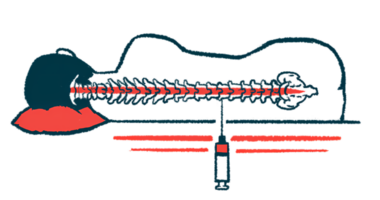Clene wins grant to develop CNM-Au8 for progressive MS
Funding comes from National MS Society's Fast Forward Program

The National Multiple Sclerosis Society has awarded Clene Nanomedicine a grant to advance its treatment candidate CNM-Au8 for people with nonactive, progressive forms of multiple sclerosis (MS).
The funding comes from the MS Society’s Fast Forward Program, which supports commercial organizations developing promising new MS therapies, particularly those that may promote nervous system repair and regeneration.
The one-year grant supports a new dosing group in the ongoing Phase 2 REPAIR-MS study (NCT03993171), which will include up to 15 people with primary progressive or nonactive secondary progressive MS.
REPAIR-MS, which already dosed a group with relapsing-remitting MS (RRMS), is evaluating the therapy’s ability to boost brain metabolites associated with energy production, its target mechanism.
Part 2 is recruiting participants with progressive types of MS, ages 18-70, at the University of Texas Southwestern Medical School. Participants must be on stable treatment with a CD20 inhibitor or a S1P modulator, such as Ocrevus (ocrelizumab) or Mayzent (siponimod), and have no signs of a relapse or inflammatory brain lesions in the past five years.
“We are thrilled to be the recipient of a prestigious Fast Forward Grant and eager to advance our understanding of CNM-Au8 in the treatment of non-active progressive MS,” Karen Ho, PhD, Clene‘s vice president of translational medicine, said in a company press release.
“We embrace the opportunity offered to us by the National MS Society to continue to develop CNM-Au8 as a unique disease-modifying treatment that addresses energetic deficits associated with neurodegeneration,” said Benjamin Greenberg, MD, head of medicine at Clene.
CNM-Au8 is an oral suspension of gold nanocrystals that works to boost energy-producing reactions in the central nervous system, which includes the brain and spinal cord.
In doing so, the therapy is thought to help nerve cells be better able to withstand stressors that drive their degeneration in diseases such as MS, amyotrophic lateral sclerosis, and Parkinson’s disease.
CNM-Au8 leads to nerve cell repair, remyelination
Preclinical studies have shown CNM-Au8 leads to robust remyelination and nerve cell repair in cell and animal models via its effects on energy metabolism, according to Clene. Remyelination is the restoration of the fatty substance that surrounds nerve cells, called myelin, that’s progressively lost in MS.
REPAIR-MS was designed to evaluate CNM-Au8’s ability to influence energy metabolism in the brains of patients. In its first part, 11 people with RRMS were randomly assigned to receive one of four doses (7.5, 15, 30, or 60 mg) daily for 12 weeks, or about three months.
The main goal was to evaluate changes in the ratio of two metabolic markers — NAD+ and NADH — which serves as an indicator of cellular energy production. This was assessed with brain imaging scans.
A similarly designed study called REPAIR-PD (NCT03815916) evaluated this ratio in 13 people with Parkinson’s disease.
Combined data from REPAIR-MS and REPAIR-PD showed that patients had a mean 10.4% increase in energy metabolism after 12 weeks. MS patients saw improvements in cognition, vision, dexterity, and walking speed.
The second part of REPAIR-MS will evaluate the therapy in people with nonactive, progressive disease. As in the earlier part, patients will receive daily oral CNM-Au8 for 12 weeks and the effects of the treatment on brain energy metabolites will be assessed.
“Positive results from this study will extend the demonstration of brain target engagement of CNM-Au8 to non-active progressive MS as well,” Ho said.
“The results from the newly funded study will also build on the results of the randomized, double-blind, placebo-controlled Phase 2 VISIONARY-MS trial in relapsing MS,” Greenberg said.
VISIONARY-MS (NCT03536559) enrolled 76 people with relapsing forms of MS who had stable disease, meaning they hadn’t had a relapse or new MRI activity in at least six months. Most were on immune-suppressing MS therapies.
All the participants had damage to the optic nerve that transmits signals between the eye and the brain and were randomly assigned to receive CNM-Au8 (15 or 30 mg) or a placebo daily for up to 48 weeks, or nearly a year.
Trial data indicated the therapy led to improvements in brain health, vision, cognitive, and motor function.
Based on the findings, Clene plans to launch a global Phase 3 trial of CNM-Au8 in MS patients, which would likely include patients with nonactive, progressive MS. Positive data from such a trial would support applications for the therapy’s regulatory approval.







